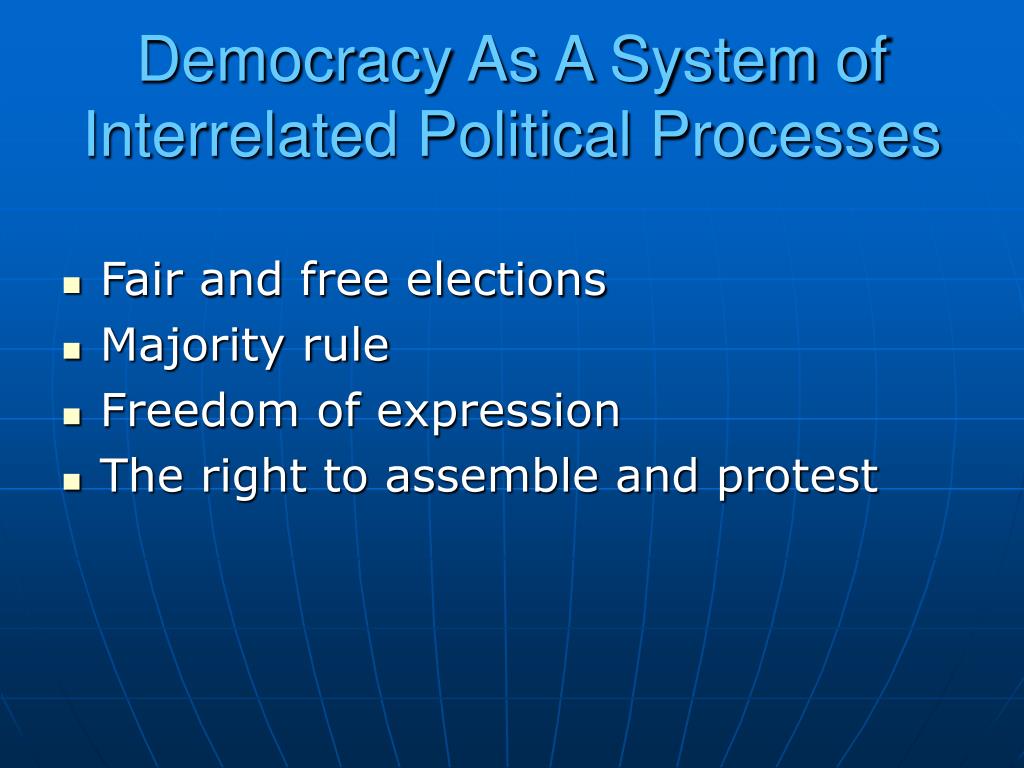

In partnership with the Norwegian Christian Democratic Party, supported by the Norwegian Agency for Development Cooperation (NORAD), a project with the Parliament of Sri Lanka was initiated in 2018. OGP grants the platform to do this, so that the Oslo Center can partake in the support of Nairobi Metropolitan Services in strengthening its democratic governance, including creating space for citizen participation.

The Oslo Center acknowledges the importance of civil society and government collaboration to create reforms that respond to the needs of citizens.
#DEMOCRATIC PROCESSES DEFINITION HOW TO#
The Oslo Center, as a civil society member of OGP Local, will offer technical assistance to NMS on conceptualizing and developing mechanisms of citizen participation, development of a citizen feedback mechanism, and how to simplify budgets for a better citizen understanding.

The NMS, in collaboration with the Oslo Center, will strengthen the budget process and enhance service delivery, including under-represented groups in slum and low-income areas in policy decision making process. In October 2020, the partnership between the Oslo Center, Nairobi Metropolitan Services (NMS), and the Open Government Partnership (OGP) was established. Additionally, the members of parliament’s representation of citizens are the foundation of inclusive governance hence the need to hold governments accountable and lobby the interest of the citizens.Īt the Oslo Center, we support institutions to facilitate transparency through reforms, as well as reviewing communications strategies to bolster transparency and accountability through inclusive information sharing The parliament has an oversight role in ensuring transparency in government. Political parties in parliament/party caucus have a responsibility regarding transparency. Whilst discharging their roles and responsibilities, it is important that regulatory and oversight bodies ensure that political institutions are transparent in their structures and operations. Institutions have a key role in ensuring transparency. Transparency is a crucial part of mitigating corruption and promoting accountability. Transparency is a cornerstone in democratic governance, as it gives citizens the opportunity to demand information and accountability. The Oslo Center aims at working with political institutions to develop responsive and efficient public participation policies, mechanisms, and processes, as well as working with political institutions in the dissemination of critical information on decision making processes to the public. It is therefore crucial to ensure that the public’s needs are met in decision-making processes. Citizens delegate this power to their preferred government through democratic elections. The most important aspect of public participation is the emphasis of public’s sovereign power. To ensure an open government, subnational executives must engage citizens in decision-making through public participation, including responding effectively to citizens’ needs. To ensure accountable democratic governance, the executive part of subnational governments plays a critical role as they implement policies and programs. For citizens to feel ownership of and trust in the policies of the government, institutions must be driven by inclusion, transparency, and accountability. Public participation is a key component of democratic governance. Institutions at the sub-national level must foster dialogue, stability, and peace through participation and consultation, as they tend to be the first line of contact with citizens. This means defining basic democratic processes for governance and political institutions, including ensuring responsiveness, control of power, and responsible use of resources.Īt the Oslo Center, we aim to assist sub-national governments, regulatory bodies, and political parties in their institution-building. Regulatory and oversight bodies are central in the maintenance of the standards of democratic practices. This means ensuring civil servants know their civic and democratic mandate and obligations, including setting the tone for democratic governance. The Civil Service is another key actor as their behavior influence how citizens are treated, considered, and centered. Political parties are key actors regarding facilitating inclusive participation where citizens can articulate their needs and demand responsiveness. Strong institutions are crucial pillars to strengthen and sustain democratic processes and norms.


 0 kommentar(er)
0 kommentar(er)
